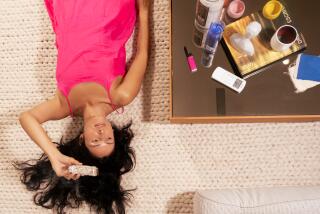Gazelle in Ethnic Skin-Care Market
- Share via
In 1979, Patricia French left Warner Robins, Ga., to study art in Paris. She worked as a runway model for the House of Chanel to earn extra money.
“That was when I decided I wanted to be in that audience buying the clothes, not on stage modeling them,” French recalls.
On a recent day, dressed in a snappy powder-blue linen Chanel suit, French admitted she’s now selective about which fashion shows she attends. As head of her own cosmetics and skin-care firm, Paris-based Gazelle International, French has little time. She sticks to the classics: Chanel, Ungaro, Valentino.
Quite a switch for a woman who grew up in a town “so small the street lights shut off at 7:20 each night.” Now, French says, she’s lucky if she gets back to her Paris apartment before 8 p.m. She’s usually still working until then.
Aiming to “head the world’s largest multinational cosmetics company for ethnic consumers,” the former free-lance makeup artist has more than a foot in the door. Her skin-care and foundation collection, designed for non-white women--”and you’ve got to remember that two-thirds of the world’s population is non-white and half of those people are women”--is now sold internationally in areas as diverse as the United States, Cameroon, France, Gabon, Ivory Coast and the United Kingdom.
Fifty-five beauty advisers tout Gazelle products in upscale U.S. specialty shops; the products are sold in Southern California only at Nordstrom stores.
French claims hers is the first line of products designed for the specific skin-care needs of dark-skinned women.
“Other collections emphasize cosmetics because traditionally that’s what black women have wanted,” she explained. “But now there’s a market for skin care. Women of color complain that they haven’t had a choice--that there was little to meet their physiological and psychological needs.”
In women of color, “the oil and sweat glands are larger so there’s a tendency for the skin to look oily,” she said. “The increased amounts of melanin (skin pigment) in the skin react with many ingredients used in traditional treatment products, so the skin is more sensitive.
“A big problem is discoloration due to pigment imbalance, dead skin-cell accumulation and acne resulting from excessive oil secretions,” she said.
From a psychological standpoint, “the beauty consultants for traditional cosmetics lines don’t always understand the special needs of women of color--they can’t be sympathetic to splotchy pigmentation if they’ve never had it,” French says. “Plus, people still expect the black woman to be a blue-collar worker with no money to spend on cosmetics. My average customer is a professional woman making $40,000 a year. She wants quality and she’ll pay for it.”
Gazelle products sell for $15.50 to $42.50, or as French describes the prices, “somewhere between Estee Lauder and Chanel.”
To meet her customer’s physiological needs, French teamed with Amale Ayad, a biochemist who had previously developed products for Christian Dior, Carven, Evian and other French cosmetics companies.
The Senegal-born Ayad formulated the Gazelle products, many of which include ultraviolet-light filters. As French said: “Many women of color have the misconception that they don’t need sunscreen. In fact, the skin possesses a natural protection mechanism that sends and distributes melanin to the surface of the skin when it is exposed to sunlight.”
In some people of color, however, too much sun may result in “blotching, scarring and uneven skin tones,” French said.
Because dark skin has large amounts of melanin, it usually doesn’t wrinkle, “so we don’t need the so-called anti-aging products that are sold to white women,” French asserted.
She points out, however, that Gazelle products designed for dry or sensitive skin are three times as popular as those for oily or acne-prone skin.
“I thought it would be the reverse, but I can assure you, black women definitely suffer from dry skin and they shouldn’t be told otherwise.”
In Los Angeles for a personal appearance at Nordstrom, French was about to slip out of her miniskirted Chanel suit and into something more comfortable for the trip back to Paris. But she had to call her husband first. Lawrence Charfoos, the prominent litigation attorney who raised the $4 million French says it took to get her company off the ground, lives in Detroit.
“We see each other about twice a month,” she said. “But you should see our phone bills.”
And although she is a legal resident of Detroit, French still resides in France. She projects that this year her firm will register a sales volume of $3 million internationally, with the United States accounting for $2 million of those sales.






